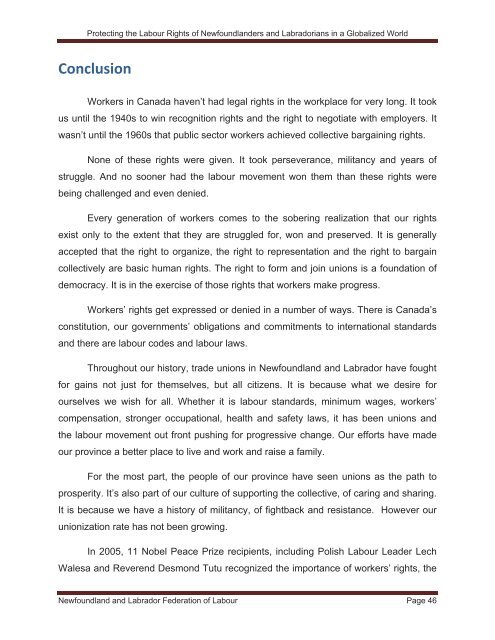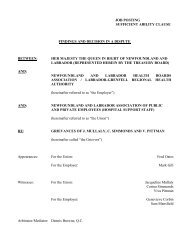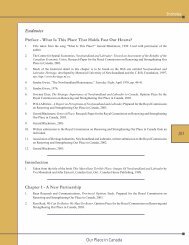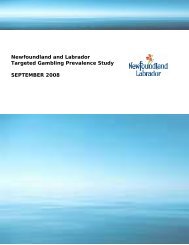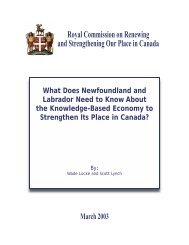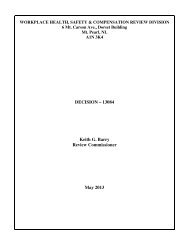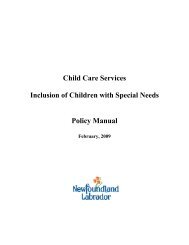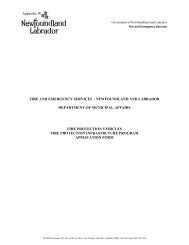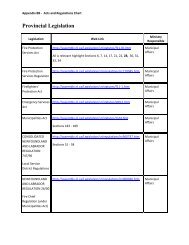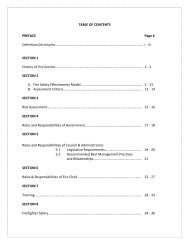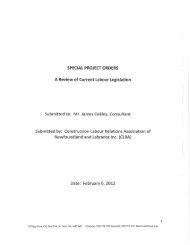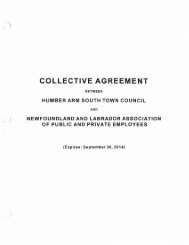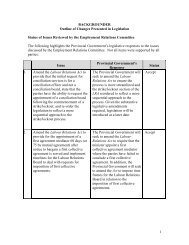January 7, 2011 - Government of Newfoundland and Labrador
January 7, 2011 - Government of Newfoundland and Labrador
January 7, 2011 - Government of Newfoundland and Labrador
Create successful ePaper yourself
Turn your PDF publications into a flip-book with our unique Google optimized e-Paper software.
Protecting the Labour Rights <strong>of</strong> <strong>Newfoundl<strong>and</strong></strong>ers <strong>and</strong> <strong>Labrador</strong>ians in a Globalized World<br />
Conclusion<br />
Workers in Canada haven’t had legal rights in the workplace for very long. It took<br />
us until the 1940s to win recognition rights <strong>and</strong> the right to negotiate with employers. It<br />
wasn’t until the 1960s that public sector workers achieved collective bargaining rights.<br />
None <strong>of</strong> these rights were given. It took perseverance, militancy <strong>and</strong> years <strong>of</strong><br />
struggle. And no sooner had the labour movement won them than these rights were<br />
being challenged <strong>and</strong> even denied.<br />
Every generation <strong>of</strong> workers comes to the sobering realization that our rights<br />
exist only to the extent that they are struggled for, won <strong>and</strong> preserved. It is generally<br />
accepted that the right to organize, the right to representation <strong>and</strong> the right to bargain<br />
collectively are basic human rights. The right to form <strong>and</strong> join unions is a foundation <strong>of</strong><br />
democracy. It is in the exercise <strong>of</strong> those rights that workers make progress.<br />
Workers’ rights get expressed or denied in a number <strong>of</strong> ways. There is Canada’s<br />
constitution, our governments’ obligations <strong>and</strong> commitments to international st<strong>and</strong>ards<br />
<strong>and</strong> there are labour codes <strong>and</strong> labour laws.<br />
Throughout our history, trade unions in <strong>Newfoundl<strong>and</strong></strong> <strong>and</strong> <strong>Labrador</strong> have fought<br />
for gains not just for themselves, but all citizens. It is because what we desire for<br />
ourselves we wish for all. Whether it is labour st<strong>and</strong>ards, minimum wages, workers’<br />
compensation, stronger occupational, health <strong>and</strong> safety laws, it has been unions <strong>and</strong><br />
the labour movement out front pushing for progressive change. Our efforts have made<br />
our province a better place to live <strong>and</strong> work <strong>and</strong> raise a family.<br />
For the most part, the people <strong>of</strong> our province have seen unions as the path to<br />
prosperity. It’s also part <strong>of</strong> our culture <strong>of</strong> supporting the collective, <strong>of</strong> caring <strong>and</strong> sharing.<br />
It is because we have a history <strong>of</strong> militancy, <strong>of</strong> fightback <strong>and</strong> resistance. However our<br />
unionization rate has not been growing.<br />
In 2005, 11 Nobel Peace Prize recipients, including Polish Labour Leader Lech<br />
Walesa <strong>and</strong> Reverend Desmond Tutu recognized the importance <strong>of</strong> workers’ rights, the<br />
<strong>Newfoundl<strong>and</strong></strong> <strong>and</strong> <strong>Labrador</strong> Federation <strong>of</strong> Labour Page 46


